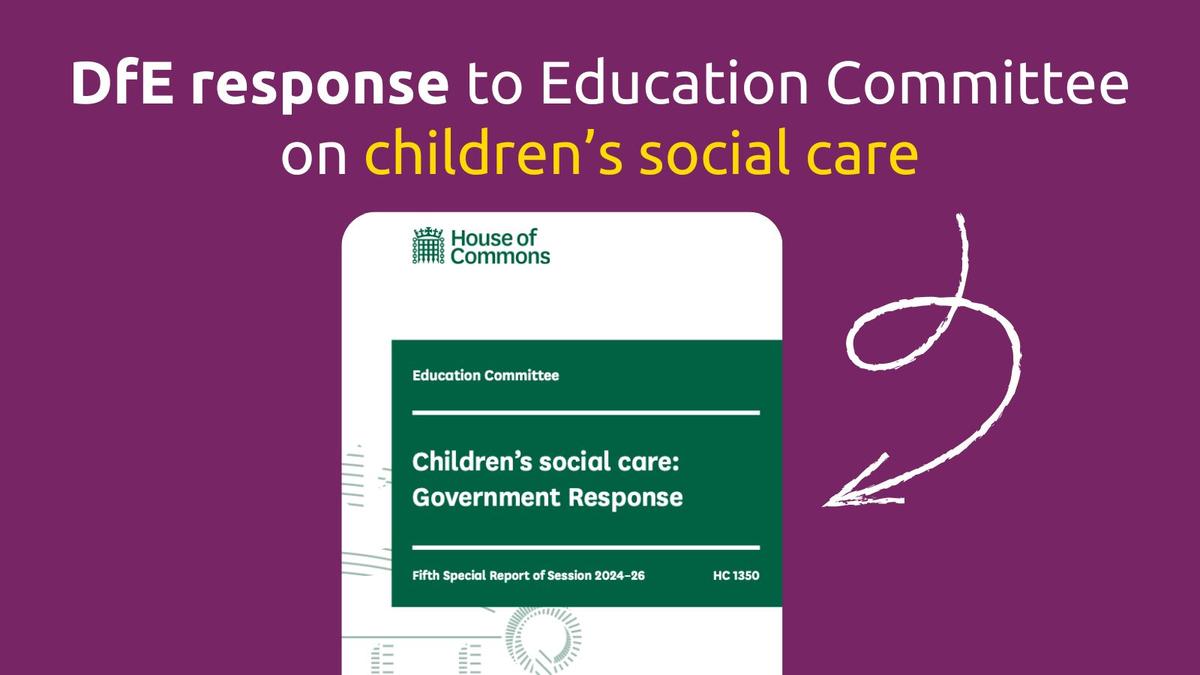DfE response to Education Committee’s children’s social care report

Background
In December 2023, the Education Committee launched an inquiry into children’s social care in England. Together Trust provided written and oral evidence.
In July 2025, the Education Committee published its report, highlighting rising demand, increasing local authority costs, and poor outcomes for some children. Its recommendations to the government were thoughtful and comprehensive.
The government’s response, gives the impression of a “wait and see” approach. Many recommendations were dismissed or only partially addressed, with little urgency shown to tackle the current crisis in children’s social care.
Here’s a summary of what we asked for, what the Committee recommended, and how the government responded.
Early Intervention & Funding
We called for more funding to support families before crises occur. The Committee agreed, requesting a larger share of funding for early intervention and annual data comparing prevention vs crisis spending.
DfE response: Local authorities are required to use grants for preventative services. Further funding details will come through the Local Government Finance Settlement.
Standards of Care & Unregistered Accommodation
We recommended all children in care, including those in semi-independent accommodation, should have consistent care standards and that resources for a new inspection regime could be better used to raise existing standards.
DfE response: Rather than introducing a single universal standard, the government plans to update outdated National Minimum Standards and work with Ofsted to reform the Social Care Common Inspection Framework. Ofsted will be given greater powers, alongside new accountability measures and stronger financial oversight. Profit caps may be considered if deemed necessary.
The continued lack of oversight in unregistered settings poses serious risks to children’s safety and wellbeing. The fines proposed in the Children’s Wellbeing and Schools Bill fail to address the underlying systemic issues or ensure safe alternatives. Moreover, the suggestion that profit caps will only be considered “if needed” reflects a lack of commitment to tackling profiteering in the sector. At Together Trust, we are calling for a clear, time-bound plan to phase out unregistered settings for children in care.
Sufficiency & Children’s Homes
We stressed that children’s homes need to be available across the country, not just in low-cost areas.
DfE response: The government plans to build 1.5 million homes and launch a £39 billion Social and Affordable Homes Programme. Foster care homes will also be expanded and renovated. Pilots through the South-East Regional Care Co-operative (RCC) (2025–26) will coordinate treatment, placements, and needs assessments.
We are concerned that even if the current pilots demonstrate impact, the roll-out of RCCs will take years, meaning it will be years before children in care across the country feel the impact.
Independent Advocacy
We advocate for an active offer of independent advocacy, ensuring all children in care and families are automatically offered access to independent advocacy.
Both the Education Committee and the Law Commission have urged the government to adopt the opt-out model of independent advocacy recommended by the Independent Review of Children’s Social Care - meaning all children in care would automatically be offered advocacy, unless they decline.
DfE response: No commitment to opt-out yet. New National Standards for Advocacy and updated statutory guidance will be introduced in 2025, including non-instructed advocacy and safeguarding standards.
Back in January 2024, we responded to the consultation on advocacy for children in care. While we welcome that work is underway, we are waiting to see the government’s final position and hope they will take our feedback on the active offer of independent advocacy into account.
Mental Health
We called for a dedicated mental health strategy, full Mental Health Support Team coverage in schools, trauma-informed services, and support up to age 25. The Committee supported most of these asks.
DfE response: No commitment for a mental health strategy. Pilots, guidance reviews, and cross-departmental collaboration aim to improve access to services and trauma-informed practice.
Short breaks and therapeutic services
We highlighted the importance of short breaks and therapeutic support. The Education Committee agreed and called the Department to conduct a review of the availability of short breaks, respite care and holiday provision for disabled children to understand where the shortages are most acute.
DfE response: Local authorities must provide short breaks and publish eligibility criteria. Lessons from the Short Breaks Innovation Programme will be published in autumn 2025.
Care-Experienced People & Workforce
We urged engagement with voluntary organisations, care-experienced young people, and development of a workforce strategy with training, retention measures, and specialist support for disabled children.
The Education Committee urged the government to involve care-experienced young people in all areas of children’s social care reform and accountability. Also, it urged the DfE to strengthen its workforce strategy with better pay, bursaries, role awareness, and inclusion of the specialist workforce for disabled children.
DfE response: Care-experienced young people are involved through advisory boards and consultations. Workforce strategy is in development, with qualifications and training under review.
Foster Care
We called for a Foster Care Retention Improvement plan, equal entitlements, and a National Care Offer for care leavers. The Education Committee called for a national fostering strategy, consultation on a foster carer register, a review of financial support, and a National Care Offer to end the postcode lottery and guarantee minimum support for care leavers.
DfE response: A national foster carer register is under consideration. Local authorities will offer Staying Close support, apprenticeship bursaries, improved Housing Benefit/Universal Credit rates, and a new care leavers’ website.
SEND
We called for targeted financial support for disabled people. The Education Committee recommended that the DWP exempt care leavers from plans to reduce Universal Credit for under-22s and prioritise them for Youth Guarantee support.
DfE response: The government is consulting on Pathways to Work proposals, including raising the UC Health Element age to 22 to remove disincentives and reinvest savings in the Youth Guarantee.
Reflections
Get involved!
-
Share this blog on social media and tag Together Trust
-
Share your views on the changes you want to see happening by emailing styliana.pasiardi@togethertrust.org.uk
-
Sign up for our campaign updates
-
Check our website news for developments





